AHJIKAN FOODS delivers the delicious flavors of Japanese cuisine to people living in the United States through the sale of Japanese delicacies such as tamago-yaki (layered egg omelets), crab-flavored fish cake, and ingredients for makizushi (sushi rolls).
AHJIKAN FOODS’ idea of “delicious” isn’t just about taste.
We are committed to spreading the delicious flavors of Japan to the US by producing great-tasting foods that are healthy, environmentally friendly, and that allow people to enjoy Japanese culture and traditions.
AHJIKAN FOODS delivers the delicious flavors of Japanese cuisine to people living in the United States through the sale of Japanese delicacies such as tamago-yaki (layered egg omelets), crab-flavored fish cake, and ingredients for makizushi (sushi rolls).
AHJIKAN FOODS’ idea of “delicious” isn’t just about taste.
We are committed to spreading the delicious flavors of Japan to the US by producing great-tasting foods that are healthy, environmentally friendly, and that allow people to enjoy Japanese culture and traditions.
Our Products and Quality
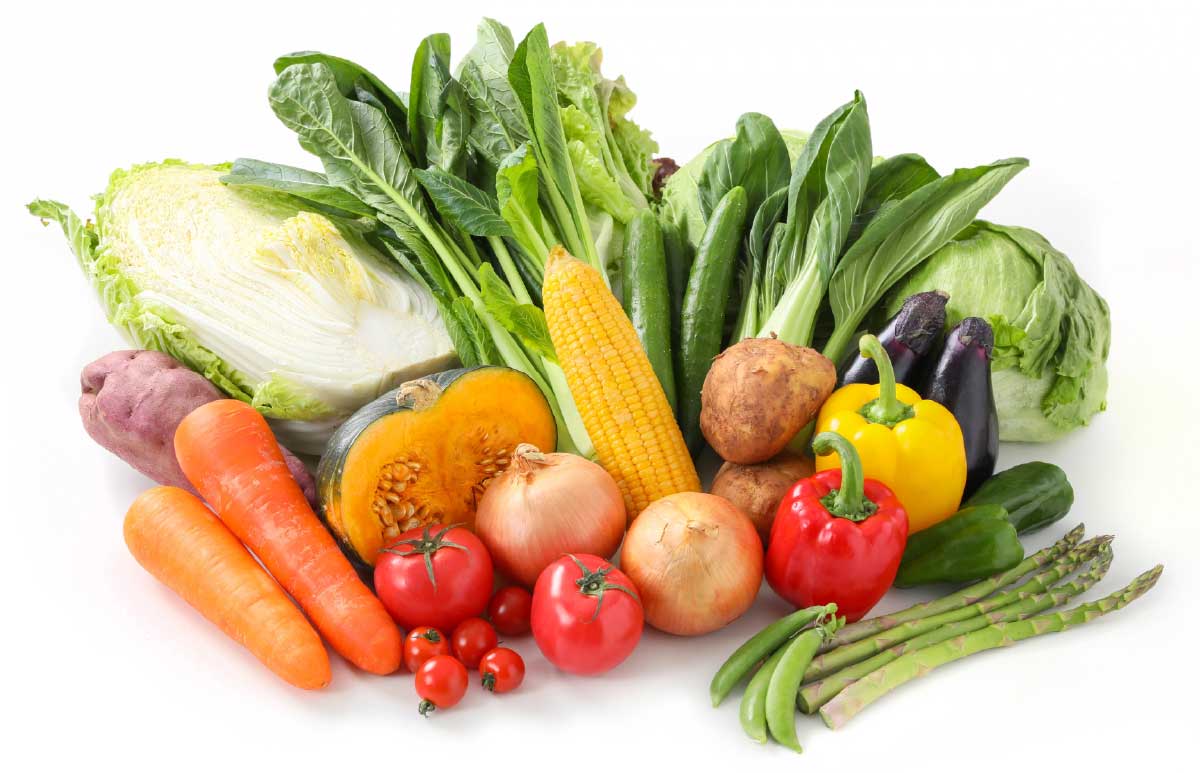

Date of FSSC 22000 certification
September 2016 4 plants (Hiroshima, Tosu, Moriya and Shizuoka)
November 2018 Tsukuba Factory
Initiatives for the SDGs
We also promote efforts for the SDGs and offer crab-flavored fish cakes that have received the MSC CoC certification.
The MSC CoC Standard provides assurance that certified fish and seafood products are kept separate from non-MSC certified products throughout the supply chain and that they are from sustainable fisheries.
The production line of our crab-flavored fish cake at AHJIKAN’s Tosu Factory in Japan was recognized for using and processing only MSC certified seafood, allowing us to produce crab-flavored fish cake that carries the MSC CoC certification. AHJIKAN FOODS, INC. is committed to selling such products that are not only delicious and safe in quality, but also friendly to the world’s marine environment.

Company Profile
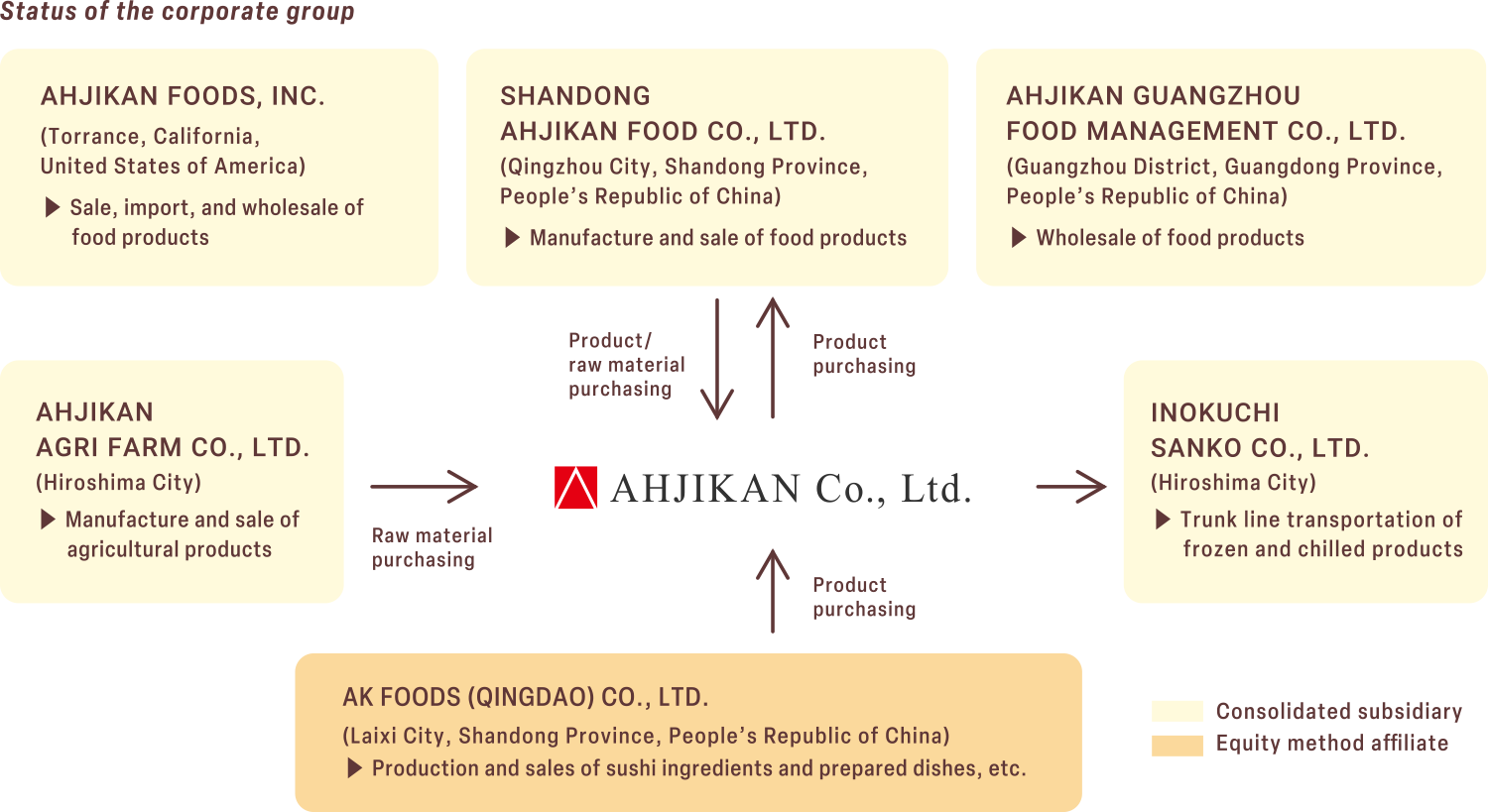
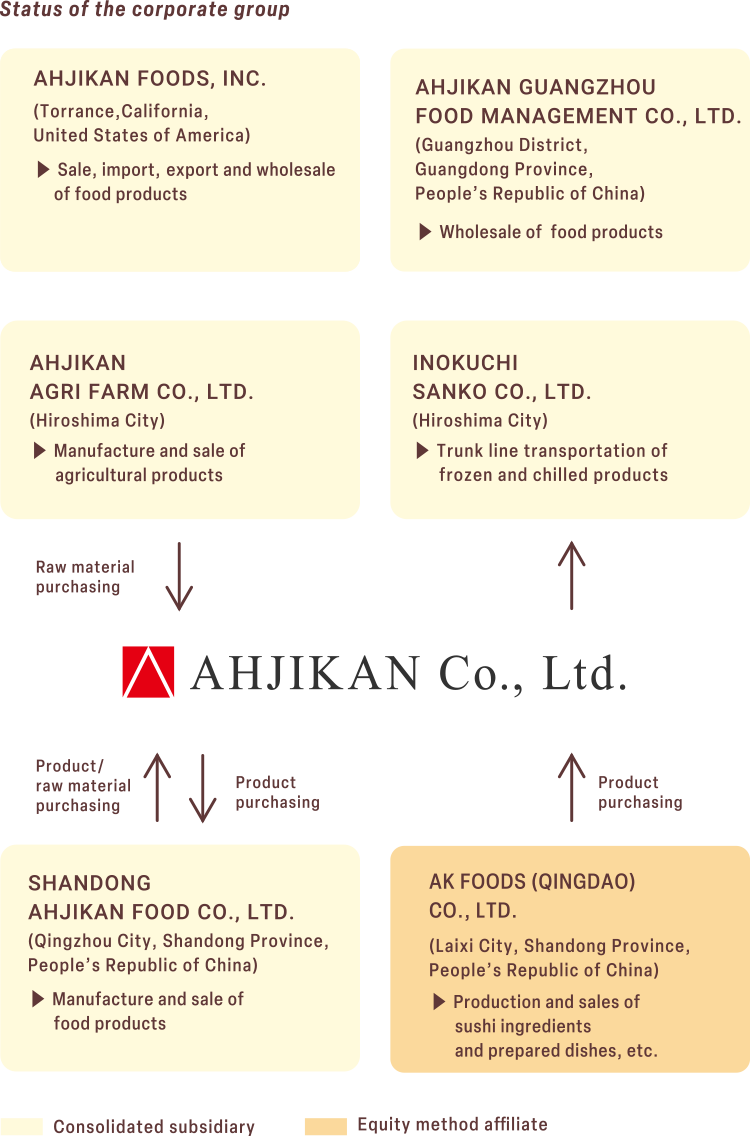
Company Data
| Company Name | AHJIKAN FOODS, INC. |
|---|---|
| Head Office | 21151 S. Western Ave. Suite 164 Torrance, CA 90501 |
| Capital | 1,000,000 U.S.dollar |
| Main Businesses | Sale, import, and wholesale of food products |
Group Companies
-
AHJIKAN AGRI FARM CO., LTD.
Head Office
382-1,Wakagurimiyamoto,Tsukuba-city, Ibaraki,300-1248,Japan
Business Description
Production, sale and processing, etc. of agricultural products
-
INOKUCHI SANKO CO., LTD.
Head Office
1-14-1,Ishiuchiminami,Saeki-ku, Hiroshima-city,731-5108,Japan
Business Description
Transportation of frozen and chilled products by main roads, charter and direct delivery (named-day / time) and contracting for warehousing work
-
SHANDONG AHJIKAN FOOD CO.,LTD
Head Office
2700 Linglongshanbei Lu, Qingzhou shi, Shandong Sheng, China
Business Description
Manufacture and sale of processed agricultural products
-
AK FOODS(QINGDAO) CO.,LTD
Head Office
225 Shenzhenbei Lu, Laixi Shi, Qingdao Shi, Shandon Sheng, China
Business Description
Production and sales of sushi ingredients and prepared dishes, etc.
-
AHJIKAN GUANGZHOU FOOD MANAGEMENT CO., LTD.
Head Office
Masai International Business Center 1004, 348 Tancun Lu, Tianhe Qu, Guangzhou Shi, Guangdong Sheng, 510655, China
Business Description
Production, sale and processing, etc. of agricultural products
The Appeal of Japanese Food
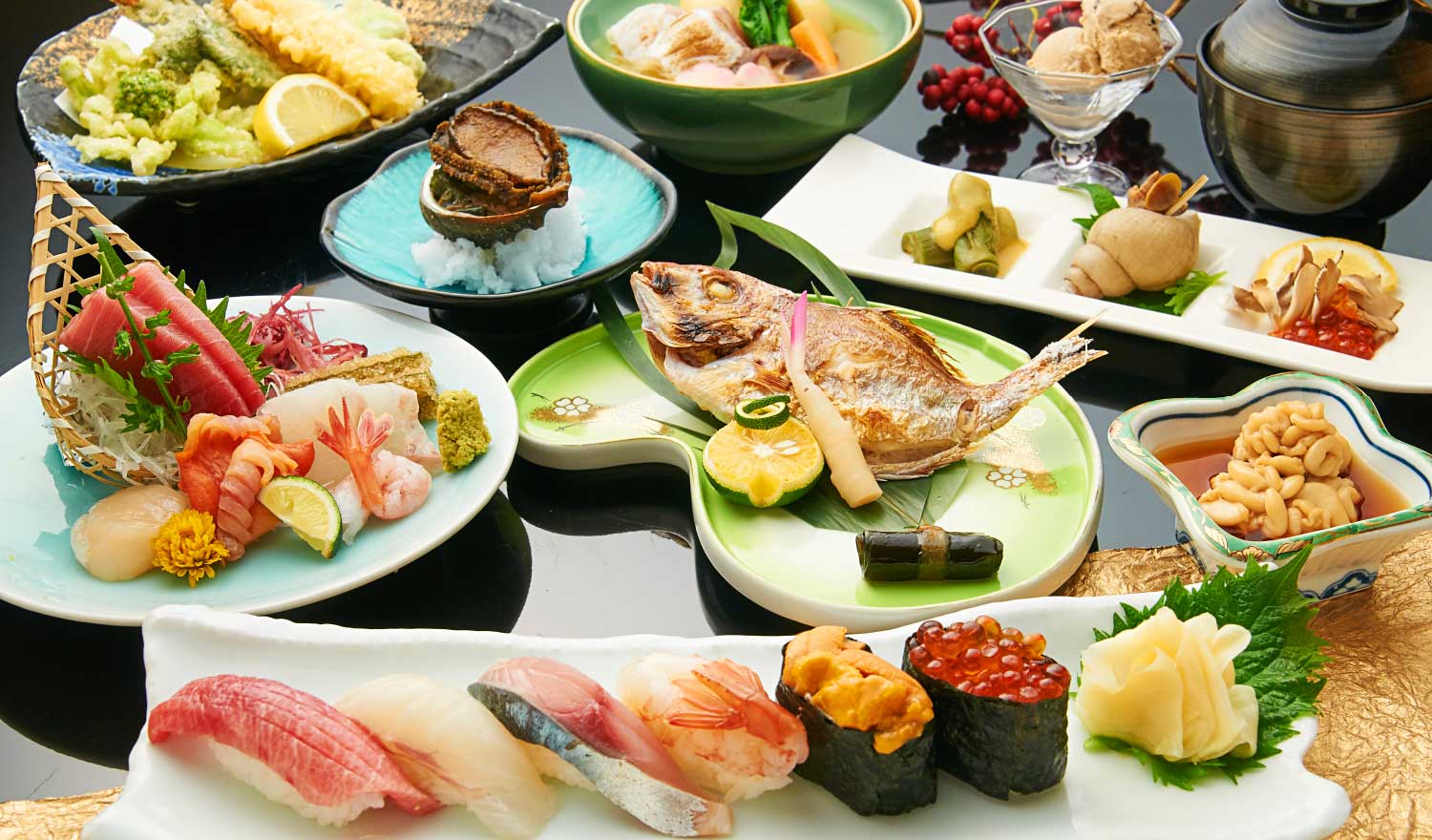
Washoku
Washoku (Japanese food); a UNESCO Intangible Cultural Heritage
Japan stretches from north to south and has four distinct seasons. The country has a culinary culture called “washoku,” which has been nurtured in the midst of the diverse nature that exists with the changing seasons. Washoku, based on the Japanese people’s inclination to respect nature, was recognized in December 2013 for its customs related to food and registered as a UNESCO Intangible Cultural Heritage under the title “Washoku, Traditional Dietary Cultures of the Japanese.” AHJIKAN FOODS is engaged in activities to promote tamago-yaki and makizushi among other washoku to the world.
Tamago-yaki (layered egg omelets)

Washoku utilizes a method known as the “Five Tastes, Five Colors, Five Senses, and Five Methods,” and tamago-yaki (layered egg omelets) play a fundamental and decorative role with their yellow color representing one of the five colors (white, black, red, yellow, blue/green). Tamago-yaki is a Japanese traditional egg omelet that is highly nutricious and is often referred to as a "complete nutritional food." In Japan, there are distinctive differences of recipes and variations in tamago-yaki. For example, there are "Atsuyaki Tamago" and "Dashimaki Tamago".
"Atsuyaki Tamago" is sweetened and baked until slightly charred, and "Dashimaki Tamago" is cooked with dashi stock without burning and is served with grated daikon radish.
AHJIKAN has been committed to the quality of its tamago-yaki since its founding in 1962. AHJIKAN also pioneered the plant production of tamago-yaki. We have always pursued not only safety and peace of mind but also a taste that closely resembles homemade tamago-yaki. Our foremost principle is to delight our customers, and we are eager to provide our customers even more delicious tamago-yaki.

Makizushi (sushi rolls)
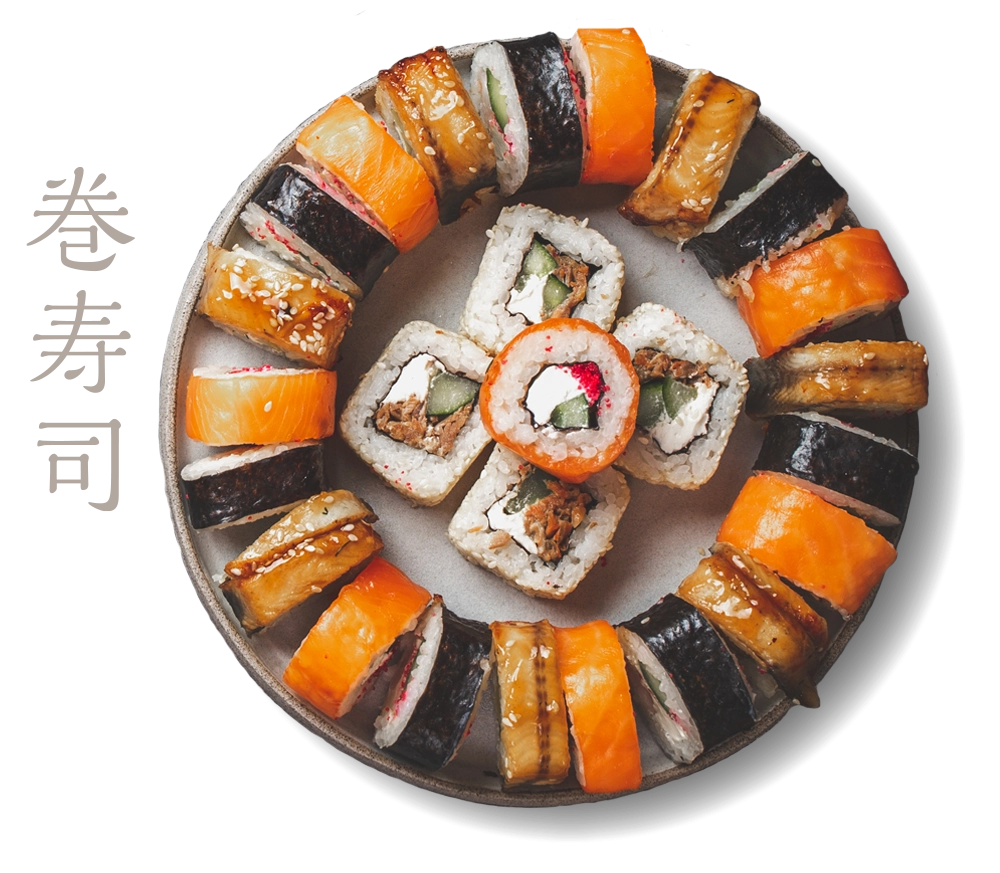
Makizushi originated in Japan during the Edo period (around 1600), and a variety of ingredients have been used to roll the sushi, reflecting the historical background and local culinary conditions. Makizushi, represented by the thick rolls wrapped in nori, have been handed down and enjoyed throughout Japan as a traditional food to celebrate special occasions. Makizushi are eaten all over Japan especially on February 3rd during the Setsubun Festival as “ehomaki,” a Japanese custom for bringing happiness. On the other hand, they have also become popular worldwide, and there are evolved forms of makizushi reflecting the diverse food culture of Japan as well as overseas countries that have developed their own variations known as Sushi Rolls.

